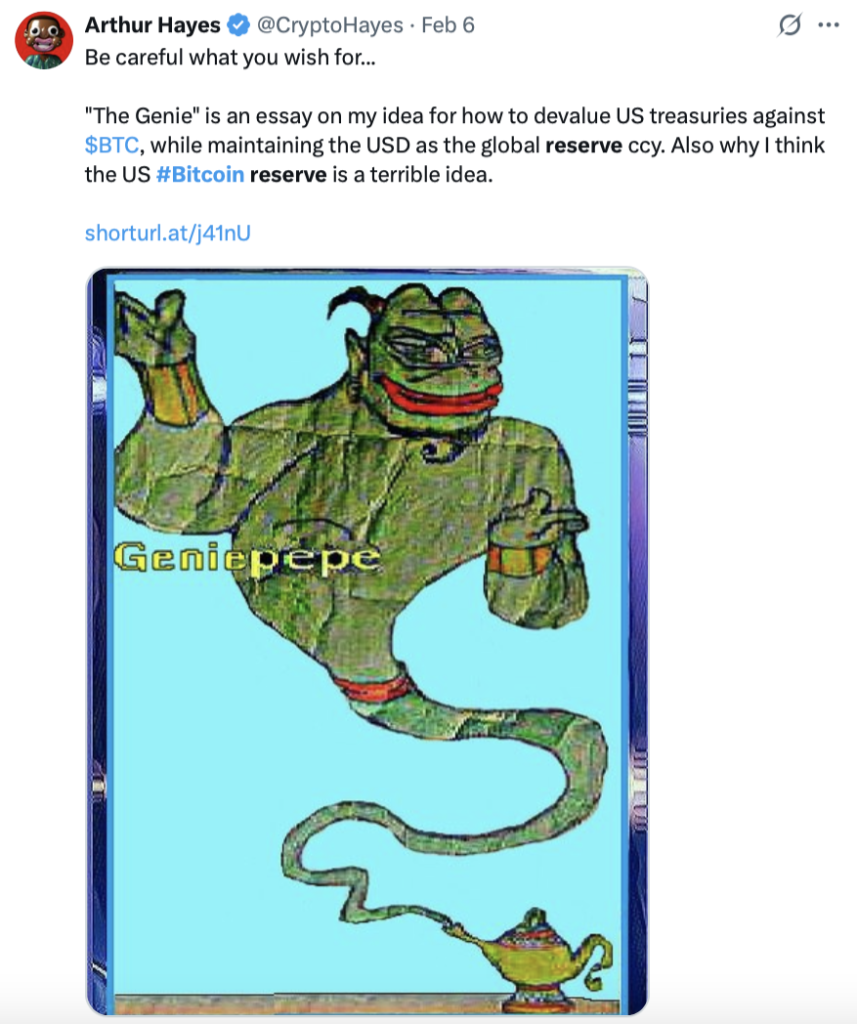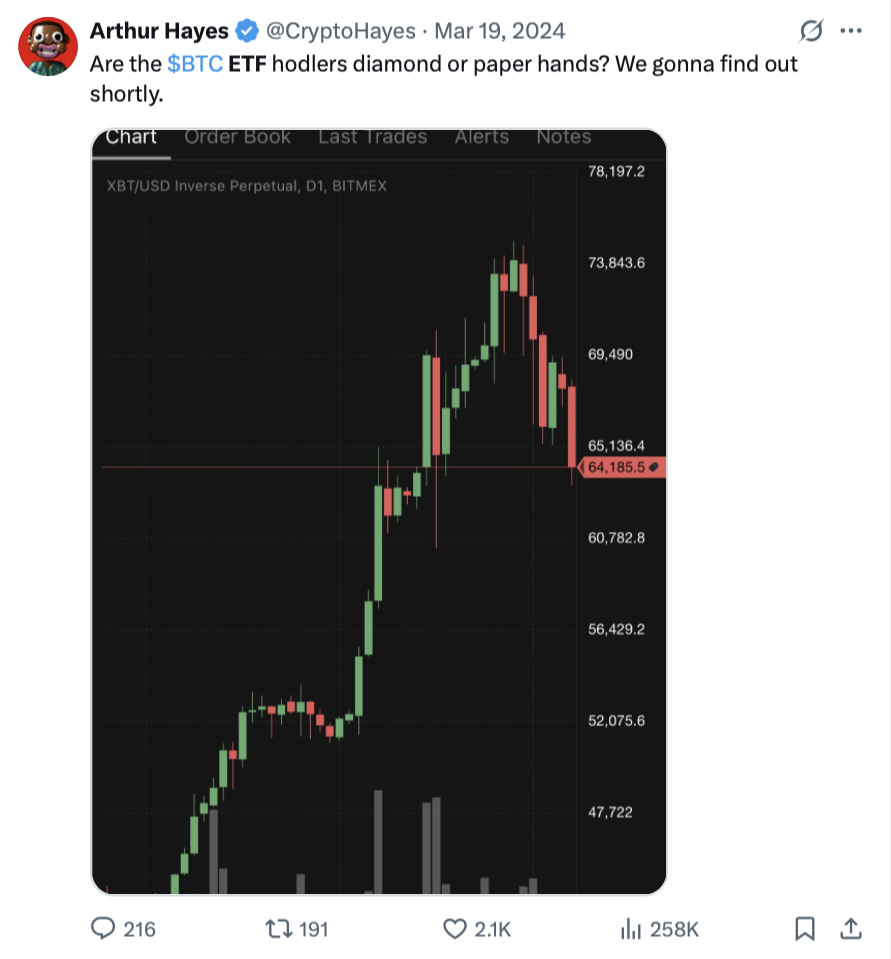Crypto
Arthur Hayes doesn’t care when his Bitcoin predictions are totally wrong

BitMEX co-founder and Bitcoin billionaire Arthur Hayes is known for making big, bold — and sometimes controversial — Bitcoin price predictions, and says it doesn’t faze him when he gets it wrong.
“Nothing really happens,” Hayes tells Magazine, who asked if he worries about backlash when his Bitcoin predictions fall flat.
Win or lose, Hayes doesn’t sweat his calls
The youngest African-American crypto billionaire in history is the first to admit that most of his price calls don’t land. “I get it wrong, and I’ve gotten most of them wrong,” he laughs.
“I don’t know why people are hesitant to do it; it doesn’t really matter at the end of the day.”
“If you’re generally correct, you’re okay,” the 40-year-old former investment banker adds.
Hayes is pretty upfront with his calls; he doesn’t hide them if he’s right or wrong.
In September, Hayes — now the chief investment officer at the VC firm he co-founded, Maelstrom Fund — made a short-term bearish call on Bitcoin, linking it to the sliding Japanese yen. However, things didn’t unfold as he had expected over that particular weekend, and Bitcoin held strong.
Fair play to Hayes; he later owned it on X, posting, “I was wrong.”
“Time to trade some dogshit memecoins,” Hayes said. Similarly, on March 24, Hayes said that Bitcoin would hit $110,000 before it retests $76,500. But just a month later, on April 9, Bitcoin sank to $76,500.
Of course, credit where it’s due; Hayes gets it right too sometimes. In December, Hayes predicted a crypto downturn and a “vicious sell-off” after US President Donald Trump’s Jan. 20 inauguration…and he was spot on.
Probably because over the years, the New York-raised Bitcoin OG has developed a super-secret method to come up with his end-of-year price targets:
“Pick round numbers that humans like.”
Hayes holding strong on $250,000 Bitcoin call for 2025
His latest call is that Bitcoin will reach $250,000 by the end of this year and is confident that Bitcoin won’t see another $70,000 drawdown on the way there.
“I really don’t see there’s going to be sort of a big binary risk-off at the moment that could spook the markets, and people will dump risks that would get us down to those levels again anytime soon,” Hayes says.
That said, Hayes isn’t on board with the super-bullish $1 million Bitcoin calls that some Bitcoiners, like Jan3 founder Samson Mow, think are possible by the end of the year.
“I think it’ll happen before the end of 2028; I don’t think it’ll happen this year,” Hayes says.

However, he’s not rushing to make any short-term predictions anytime soon. “I don’t know, we’ll see, it’s really dependent,” he says. “I usually try to make those if there’s a setup where everyone thinks one way and I think another way,” he says.
Unlike most of the wannabe trading geniuses on Crypto X, Hayes actually knows his stuff — he graduated from the University of Pennsylvania in 2008 with a BA in economics. Just six years later, in 2014, he was just 28 when he co-founded the crypto derivatives giant BitMEX alongside Ben Delo and Samuel Reed.
Hayes reflects on the home detention period of his life
In 2020, Hayes stepped down from BitMEX after the US Department of Justice charged him, along with Delo, Reed and Gregory Dwyer, for allegedly violating the Bank Secrecy Act.
Read also
Features
MegaETH launch could save Ethereum… but at what cost?
Features
How to prevent AI from ‘annihilating humanity’ using blockchain
Hayes and Delo pleaded guilty in February 2022, admitting they “willfully fail[ed] to establish, implement and maintain an Anti-Money Laundering program” at the exchange.
He ended up spending six months in home detention, confined to his house. It was a rough time, but Hayes also saw the positives.
“It sucked having to be one place you couldn’t leave and all that for six months, but I was in Miami; thankfully, it wasn’t a jail cell,” Hayes laughs.
In March, US President Donald Trump pardoned the four former BitMEX executives.

Despite the whole legal mess, Hayes remains one of the most respected Bitcoiners in the world. He’s treated like an A-list celebrity at crypto conferences, and even with his hit-or-miss track record, people still pay serious attention when he makes a price prediction.
Hayes now lives life on his own terms
Hayes can afford to make bold predictions because, unlike many crypto executives who stick to safe predictions, he’s already a multi-billionaire living life on his own terms.
And that was Hayes’ plan all along.
“I always got into this game trying to have control of my time,” he says. Hayes admits his life is pretty comfy at the moment. “I work out like two to three hours a day, read a lot of books, and then, you know, write here and there,” he says.
While Hayes does the heavy lifting in the gym, he says his team at Maelstrom Fund does most of the firm’s heavy lifting, “scouring the world for decent stuff to do.”
He admits he does work here and there for the fund, but he loves living the high life.
“I know I’m perfectly happy that I’m able to, you know, play tennis when I want to, go skiing, all that kind of stuff,” he says, adding:
“It’s not really about how many Bitcoins I have or how much, you know, cash in my bank account or in my wallet. It’s really, you know, can I go pay for my friends or go skiing for six months if I want to.”
Will the US government actually buy Bitcoin?
It was only fitting to ask Hayes what his numerical prediction was for the US government actually buying Bitcoin for its Strategic Bitcoin Reserve, which Trump signed off on in March.
“I’d say it’s a 1% chance,” he says.
“I’m still of the same opinion that they’re not going to sell the 200,000 Bitcoin that they seized, but I don’t see the US government printing money to buy Bitcoin,” he adds.

Even if other countries adopt a Bitcoin reserve, Hayes says 200,000 BTC is already worth “how many billions of dollars.”So, from the US perspective, it probably won’t trigger much FOMO compared to other nations.
“Everyone else, China probably has a similar amount, but they mined it. So I think more likely countries will mine Bitcoin rather than print money and then go take printed money and buy Bitcoin, assuming they’re a deficit nation,” he says.
Read also
Features
Real-life Doge at 18: Meme that’s going to the moon
Features
All rise for the robot judge: AI and blockchain could transform the courtroom
“It’s a bit different if you actually generate income as a nation,” he says.
Surprisingly, Hayes has never been an advocate for the US Bitcoin Reserve. On May 1, Hayes said in an interview that he is “not really into the whole Strategic Reserve situation.”
At the time, he said it is hard to imagine any “properly elected” politician openly announcing that the government plans to print money to buy Bitcoin when the popular narrative is a bunch of Bitcoin bros going to the club.”
Bitcoin treasury companies will become “less important”
Hayes also shared his forecast on Bitcoin treasury companies, speculating that the newer firms will become more redundant.
“I think that they’re going to become less and less important as these trades get a bit more saturated,” Hayes says.
“Every subsequent one of these treasury companies, at least if it’s in a market that already has one, they don’t do so well, but it’s harder to generate a non-dilutive accumulation of Bitcoin,” Hayes explains.
He says most treasury companies will do a rights offering that decreases the ownership percentage per share, and then use the proceeds to buy Bitcoin, which is a “very dilutive strategy.”
“It’s hard to keep replicating that, especially in an almost saturated market like the US, maybe in other markets where they don’t have a MicoStrategy, then you’ll be able to do this a few times,” he says.
Bitcoin ETFs will trump Bitcoin treasury companies
Hayes is more bullish about spot Bitcoin exchange-traded funds; however, he doesn’t have a prediction of how much money will flow into the ETFs by the end of the year.
“I think it will continue to have inflows just because it’s the easiest way for anyone who’s got, like traditional fiat assets, to deploy into crypto,” Hayes says.
“They don’t have to worry about custody. It’s a one-for-one replicate.”

He predicts that since fund managers trust spot Bitcoin ETFs — and more regulators and banks are letting funds invest in them — they’ll “obviously suck capital” away from Bitcoin treasury companies.
“As a retail [investor], [they’ll be thinking] well, is that another sucker who’s going to pay a premium to do the simplest thing of buying Bitcoin,” he says.
What are the biggest unknowns for Bitcoin?
When asked if he sees any near-term risks to Bitcoin’s price, Hayes points to the possibility of a worldwide conflict erupting.
“Obviously, if there’s some sort of global war,” Hayes says. But if a full-scale world war broke out, he’s uncertain whether the price would rise or fall.
“Bitcoin could do really well or could do pretty poorly. Who knows what will happen in that situation?” Hayes says.
He brushes off the common fear among many Bitcoiners that quantum computing could break Bitcoin’s security.
“I think there’s so many people focused on that particular problem that I don’t think that’s going to be ultimately an issue for Bitcoin,” he says.
Subscribe
The most engaging reads in blockchain. Delivered once a
week.


Ciaran Lyons
Ciaran Lyons is an Australian crypto journalist. He’s also a standup comedian and has been a radio and TV presenter on Triple J, SBS and The Project.

Crypto
CZ Questions TON’s UAE Golden Visa Program

Former Binance CEO Changpeng “CZ” Zhao has questioned a TON Foundation initiative claiming to offer a UAE Golden Visa. On February 8, Zhao pointed out the lack of official UAE confirmation, raising doubts about the program’s legitimacy.
The initiative claims to offer a 10-year UAE residency for stability and regional access but without government backing.
This article examines TON’s announcement, Zhao’s skepticism, and the implications for crypto users seeking a presence in the UAE.
TON’s Golden Visa Announcement
On February 5, the TON Foundation, the organization supporting The Open Network. The program was promoted as a special pathway for TON community members to obtain a UAE Golden Visa, requiring a minimum holding of $50,000 in Toncoin.
The announcement generated significant excitement. The UAE Golden Visa offers a 10-year renewable residency, allowing foreigners to live, work, and study without a local sponsor. It’s popular among investors, entrepreneurs, and skilled professionals particularly in tech and crypto.
TON’s program was framed as a way to strengthen its ties with the rapidly growing crypto ecosystem in the UAE. The collaboration with HUMAN Protocol was intended to facilitate the application process, making it more accessible for crypto natives. The promise of an easier route to long-term residency was a powerful incentive for many in the TON ecosystem.
CZ’s Skepticism and the Community’s Reaction
Just a few days after the announcement, Changpeng “CZ” Zhao took to X (formerly Twitter) to voice his concerns. In a post, he stated, “The UAE government has not announced this. This is high risk.” His comment quickly gained traction, given his prominent status in the crypto world and his own residency in the UAE.
Zhao’s warning centered on a critical point: the absence of any official statement from UAE government bodies. Typically, updates or new developments in national visa programs, such as the Golden Visa, are announced via official government channels. The silence from the UAE authorities was a major red flag.
Following CZ’s post, the crypto community became divided. Some users thanked him for the alert, sharing their own suspicions about the program’s authenticity. Others pointed out that official announcements can sometimes lag behind partnership-driven initiatives. However, the prevailing sentiment shifted toward caution. Zhao’s intervention prompted a reassessment of risks, need to verify information with government sources before committing funds or personal data.. The incident underscores the crypto adage: “trust, but verify.”
The Importance of Official Verification
This episode highlights a crucial lesson for anyone involved in the crypto industry: always seek official verification. The allure of exclusive opportunities can sometimes lead individuals to overlook potential risks.
Relying on third-party announcements, even from reputable organizations, without cross-referencing them with official government sources can be dangerous. Scams are unfortunately common, and they often exploit the excitement around popular trends or programs like the Golden Visa.
For those interested in the UAE Golden Visa, consult the official UAE government websites or recognized service centers. These official portals provide accurate, up-to-date information on eligibility criteria, application processes, and authorized partners. Acting on unverified information not only poses a financial risk but can also lead to serious legal complications.
Looking Ahead: Clarity on the Horizon?
CZ’s questions have put pressure on both the TON Foundation and the UAE government to clarify the situation. The TON Foundation needs a endorsement to maintain credibility, that protect applicants and safeguard the integrity of its visa programs.
As of now, the situation remains unresolved. The lack of an official announcement continues to fuel speculation and caution. The crypto community would be wise to treat TON’s Golden Visa pathway with a healthy dose of skepticism. This event is a powerful reminder that in the fast-moving world of cryptocurrency, due diligence and official confirmation are non-negotiable.
Frequently Asked Questions (FAQs)
What is the UAE Golden Visa?
It grants foreigners up to 10 years of residency to live, work, or study without a local sponsor. It targets investors, entrepreneurs, scientists, students, and other skilled individuals to attract talent to the country.
What did The Open Network (TON) announce?
The TON Foundation and HUMAN Protocol claim $50,000 in Toncoin can unlock a UAE Golden Visa.
Why did Changpeng “CZ” Zhao question the program?
CZ, former Binance CEO, questioned the program’s legitimacy due to the lack of an official UAE government announcement or confirmation. He highlighted this as a “high risk” for potential applicants.
Has the UAE government commented on TON’s program?
As of now, UAE government sources have remained silent on the matter. There has been no official statement confirming or denying their involvement in the initiative announced by the TON Foundation.
What should I do if I am interested in the UAE Golden Visa?
You should always consult official UAE government websites and authorized service centers for information on the Golden Visa.
Crypto
Bitcoin Price Could See “Brief Rally Halt”: Here is Why

Key takeaways:
- Bitcoin price taps $110,000, but low spot buying demand suggests the upside could be limited.
- High retail FOMO and a near-overbought RSI signal a potential BTC price correction.
Since hitting a three-week high of $110,300 on July 2, Bitcoin (BTC) has formed lower highs and lower lows on the 1-hour chart.
As the end of the week approaches, BTC price has failed to break above the all-time high at $112,000.
What’s keeping Bitcoin price below $112,000?
Bitcoin’s price has risen 5% in the past 48 hours, hitting an intraday high of $110,392 on July 3.
However, a lack of buyers is limiting its push above the $112,000 all-time high. The spot volume delta shows net buying on exchanges remains negative despite BTC’s breakout attempt.
Related: Bitcoin may tap $116K in July amid ‘perfect storm’ of macro catalysts
This indicates weak momentum, which could trigger a pullback or consolidation if derivative-driven gains outpace spot market support.
“BTC is breaking out, but where’s the spot demand?” notes market data provider Swissblock Technologies in its latest X post, adding:
“Without real demand, breakouts run on fumes. We need buyers to sustain the price breakout.”
Looking ahead, K33 Research notes that spot volumes are typically lower from June to October, with July historically accounting for just 6.1% of annual trading.
. This could stop BTC’s attempt to hit fresh record highs over the next few weeks.
K33 Research wrote:
“Although July 2025 brings potential catalysts, including Trump’s budget bill, tariff decisions, and a crypto executive order deadline, seasonal patterns suggest markets may continue drifting in low-volume and low-volatility doldrums despite the busy news backdrop.”
As Cointelegraph noted, Bitcoin needs new spot buyer demand to break out of its current range and enter price discovery.
BTC price could see a “brief rally halt”
Bitcoin’s surge to $110,000 has triggered FOMO, with retail traders pushing for higher prices, Santiment reports.
“The crypto crowd has officially shifted from FUD to FOMO as Bitcoin climbs to $109.8K,” a July 3 post on X stated.
However, crypto market sentiment, currently in “greed” territory at 73, often signals a contrarian move.
Historically, when retail traders exhibit excessive optimism, markets tend to reverse or pause as pro investors capitalize on overbought conditions.
If accompanied by high trading volumes and speculative bets, this greed-driven sentiment can inflate prices temporarily, resulting in a pullback.
Bitcoin’s relative strength index, or RSI, displays near overbought conditions in four out of six timeframes. This suggests that the price is entering the exhaustion zone, hinting at a potential correction in the shorter term.
As Bitcoin nears $110,000, rising euphoria may trigger a brief pause or consolidation before the uptrend continues.
Santiment wrote:
“Prices move opposite to retail traders’ behavior, so don’t be surprised by a brief rally halt while greed is high.”
This article does not contain investment advice or recommendations. Every investment and trading move involves risk, and readers should conduct their own research when making a decision.
Crypto
Russia’s Energy Ministry Launches Crypto Mining Register

Russia’s energy ministry has launched a national registry of crypto mining rigs to weed out miners that dodge tax payments and illegal setups that steal power from the grid.
State-run newspaper RIA Novosti said in a report on Friday that the Russian Ministry of Energy, the Federal Tax Service and the Ministry of Digital Development of Russia have “compiled a register” and sent it to “regions with increased miner activity.”
In June, Russian Finance Ministry official Ivan Chebeskov said that despite introducing crypto mining laws, only 30% of miners had entered the Federal Tax Service Register since late 2024. He also said the ministry was working on measures to bring the remaining 70% into the legal fold.
Russia hopes to tax and regulate crypto mining
Deputy Energy Minister Petr Konyushenko said in an interview with RIA Novosti, translated to English by Google, that this is a step toward “legalizing the industry and reducing illegal consumption.”
“The creation of such a register will allow for the precise identification of consumers using electricity for mining needs. This is necessary for applying special regulation and taxation to them.”
Russia’s Energy Ministry first flagged plans to create a national registry of crypto mining rigs and other related hardware in February to help enforce bans on mining in regions where it is prohibited, according to RIA Novosti.
Some Russian regions ban crypto mining
The Russian government began enforcing a crypto mining-related bill in November, introducing legal definitions and registration requirements for mining businesses.
-

 Tech4 months ago
Tech4 months agoThe Key Technology Trends Shaping 2025: AI, Computing, and Human Synergy
-

 Crypto6 months ago
Crypto6 months agoBitcoin Price Could See “Brief Rally Halt”: Here is Why
-

 Health4 months ago
Health4 months agoNature’s Pharmacy: How Plants Help in the Fight Against Breast Cancer
-

 Crypto6 months ago
Crypto6 months agoUK Sends 2 to Prison for Combined 12 Years for Crypto Scam
-

 Crypto6 months ago
Crypto6 months agoRussia’s Energy Ministry Launches Crypto Mining Register
-

 Crypto5 months ago
Crypto5 months agoCZ Questions TON’s UAE Golden Visa Program